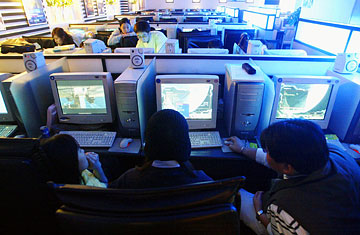
South Korean students play computer games at an Internet café in Seoul on March 25, 2003
(2 of 2)
South Korea is not alone in its quest. The Chinese government has opened at least eight treatment clinics for compulsive gamers; in the past staff members at some clinics allegedly used electric shocks on patients and forced them into locked cells. Controversy over the methods led the Ministry of Health in 2009 to order a clinic in Shandong province to halt its practices. China, too, has recorded a number of bizarre video-game-related deaths. In 2005, a 13-year-old boy jumped off a building in Tianjin province, leaving several suicide notes written from the perspective of his character in World of Warcraft. More recently, the U.S. has been acknowledging the problem. In 2009, a large rehabilitation center opened near Seattle, while other, smaller clinics scattered throughout the country have treated computer addiction for decades. In Europe, the first treatment clinic for obsessive gamers opened in Amsterdam in 2006.
Critics say that by imposing a curfew on computer games, the South Korean government is attacking a symptom, not the root of the problem. They point out that South Koreans work by far the most hours among the 30 countries in the Organization for Economic Co-operation and Development, an international body based in Paris that comprises the world's richest countries. Added to that, parents often pressure youngsters to study at intensive "cram schools" late into the night, another factor experts say creates stress and has contributed to the country's video-game-addiction problem.
Others who oppose the new curfew say it's a matter of business. "Regulating [video gaming] is a violation of the rights of game users and developers," says Koh Byung-hun, head of the Korea Game Development Association, a trade organization based in Seoul. "Korea is popular for its gaming industry. This kind of regulation is contrary to what the government says it wants for the industry." Two of South Korea's largest game developers, NCSoft and Nexon, control almost a quarter of the world gaming market. Teenagers could also find ways to outwit what some see as a clumsy solution. "If teenagers can't play games late at night, they will find other ways to have fun by drinking and smoking," says Shin Tae-kyun, a 17-year-old gamer. "Or instead of playing during the night, they'll play during the day, when they should be studying."
Some teenagers have already been exploiting loopholes to play games that are restricted to adults by signing up using their parents' government-assigned identification numbers, which are used to open online gaming accounts. To better enforce the new curfew, the government says it might begin fining parents whose ID numbers are being used by their children. Still, with many gamers clamoring over the rumored release of StarCraft II later this year, government officials may soon be overwhelmed as they try to put restraints on an intense national sport.
